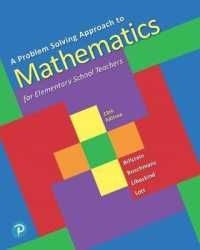- ホーム
- > 洋書
- > 英文書
- > Science / Mathematics
Full Description
In recent years philosophers of science have urged that many scientific theories are extremely useful and successful despite being internally inconsistent. Via an investigation of eight alleged 'inconsistent theories' in the history of science, Peter Vickers urges that this view is at best overly simplistic. Most of these cases can only be described as examples of 'inconsistent science' if we employ reconstructions of science which depart from the real (history of) science to an unacceptable degree. And where we do find genuine inconsistency he argues that the nature of--and correct response to--the inconsistency differs dramatically depending on the details of the science in question. Thus we are warned against making overly general claims about 'science': what are all called 'theories' in the history of science are actually significantly different entities, which work in different ways and react to inconsistency in different ways. Vickers argues that the traditional goal of philosophy to make substantial, fully general claims about 'how science works' is misguided, and can be significantly circumvented if we re-frame our debates such that reference to 'theories' is eliminated. In this way one is not tempted to think of the history of science as a history of instances of the same kind--theory--about which one could hope to say something substantial and general. And in addition eliminating theory means that we avoid fruitless debates about the 'real' nature and content of 'theories'. Vickers' account leads to a particularist philosophy of science, where the reader is urged to appreciate the often dramatic differences between the different 'inconsistencies in science' which have been identified.
Contents
1. Introduction ; 2. Concepts and Method ; 3. Bohr's Theory of the Atom ; 4. Classical Electrodynamics ; 5. Newtonian Cosmology ; 6. The Early Calculus ; 7. Further Examples ; 8. Conclusion ; Bibliography








